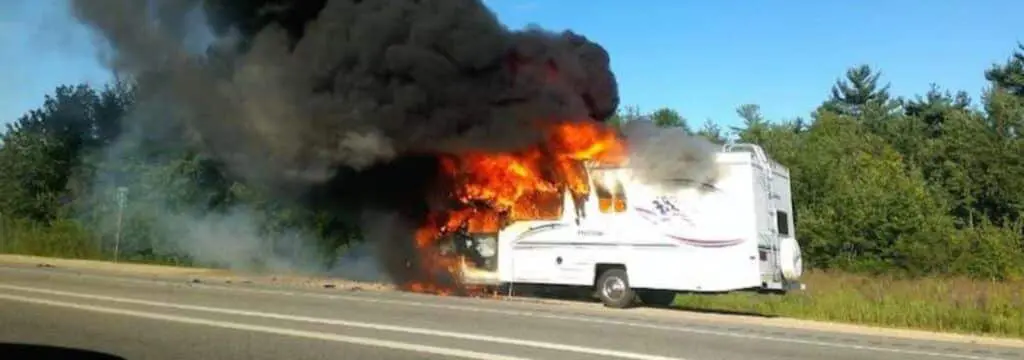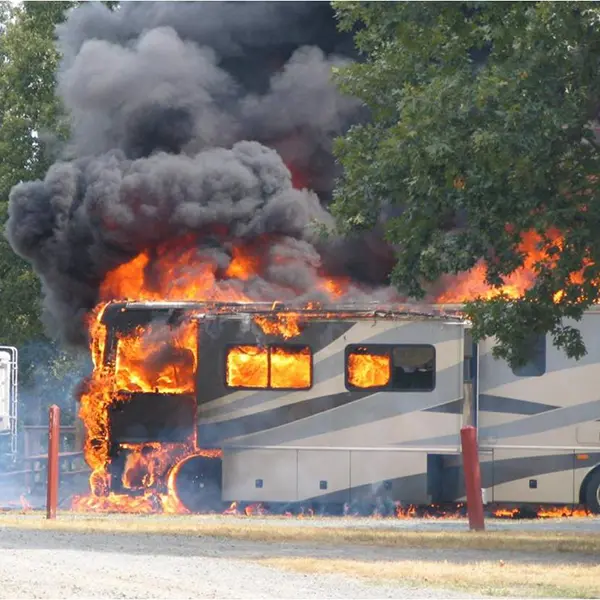There’s something magical about life on the open road. The freedom, the sights, the experiences—RV living really has its perks. But like with anything else, it also comes with its own unique set of risks. One of the biggest? RV Fire Safety. If you’ve ever been startled awake by a smoke alarm or scrambled to check the stove, you know exactly what I mean. The truth is, RV fires happen more often than most of us realize, and they’re one of the most dangerous risks RVers face.
RV fires don’t just come out of nowhere. They often start small and escalate quickly, meaning it’s essential to know what causes them and, more importantly, how to prevent them. With a few careful steps, you can prevent accidents and be prepared to respond if they do happen. Let’s dive into some statistics, common risks, and my personal top 10 must-haves for RV fire safety.
Fire Statistics on the Road
Before we dive into the must-haves, here are a few stats to underscore why this is important:
- RV Fire Frequency: According to the National Fire Protection Association, RV fires happen around 20,000 times each year in Canada and in the U.S. alone.
- Rapid Spread: Due to the compact, often flammable interiors of RVs, fires can spread faster than in most residential homes.
- Causes of RV Fires: About 70% of RV fires start from electrical issues, either due to faulty appliances, wiring, or overloaded circuits. Propane leaks are also common culprits.
My Fire Scare on the Road
Early in our RVing days, I remember an incident that put everything into perspective. We were camping in a quiet spot by a lake. One chilly evening, I switched on our propane heater and went outside to chat with a neighbor. Only a few minutes later, I smelled smoke and turned around to see a small flame near our heater vent. It wasn’t a big fire, but it made my heart race! Thankfully, we had a fire extinguisher nearby and knew how to use it. The fire was out in seconds, but the shock lingered.
That experience taught me a valuable lesson: fire safety is not optional; it’s a necessity.

10 Must-Haves for RV Fire Safety
Here’s a list of must-have items and habits that have kept me and my family safe over the years. Each one is a small step, but together they make a huge difference.
1. Smoke and Carbon Monoxide Detectors
- Why: Smoke and carbon monoxide (CO) detectors are the first line of defense.
- Tip: Test your detectors monthly, and change batteries twice a year. Consider dual detectors that alert you to both smoke and CO to save space and keep things simple.
2. ABC-Rated Fire Extinguishers
- Why: An ABC-rated fire extinguisher can tackle a range of fires, including electrical and propane fires.
- Tip: Keep at least two on board—one near the kitchen and one close to the bed. Practice using it so you’re prepared under pressure.
3. Fire Blanket
- Why: A fire blanket can smother flames quickly, especially if they’re small.
- Tip: Store it near the kitchen, where fires are most likely to start. In tight quarters, a fire blanket is invaluable since it can tackle flames fast without the need for chemical extinguishers.
4. Propane Leak Detector
- Why: Propane is a silent danger in RVs; leaks can cause explosions if undetected.
- Tip: Install a propane detector in the kitchen area, and regularly inspect your propane lines for wear and tear.

5. Escape Plan and Route
- Why: When a fire breaks out, seconds count. Knowing your escape route can make all the difference.
- Tip: Familiarize yourself with the RV exits and practice a quick evacuation. Make sure everyone in the family knows where to go in an emergency.
6. Emergency Exit Windows
- Why: Having a clear exit can save lives if a fire blocks other doors.
- Tip: Check your RV’s emergency exit windows periodically to ensure they’re functioning properly. Sometimes, they can stick if they haven’t been used in a while.
7. Electrical Surge Protector
- Why: Overloaded electrical circuits are a common cause of RV fires.
- Tip: Use a quality surge protector to prevent electrical overloads, especially if you’re at an older RV park with fluctuating power.
8. Battery Disconnect Switch
- Why: In an emergency, you may need to quickly cut all power to prevent an electrical fire from spreading.
- Tip: Install a battery disconnect switch near the RV’s main power source, and make sure you can reach it easily.
9. Regular Inspections for Wiring and Appliances
- Why: Frayed wires or loose connections can be potential fire hazards.
- Tip: Before any long trips, check wiring and appliances, especially if you’ve made any upgrades. Have a professional inspect your setup annually if possible.
10. First Aid Kit
- Why: Fires, no matter how small, can cause injuries. A well-stocked first aid kit is essential for treating burns, cuts, and scrapes.
- Tip: Keep it in an easily accessible location and check it regularly to replace expired or used items.

Practical Tips for RV Fire Safet
- Keep an Eye on the Kitchen: RV kitchens are small and prone to spills, grease buildup, and accidents. Never leave the stove unattended, and avoid cooking on high heat unless necessary.
- Limit Extension Cord Use: RV electrical systems can get overwhelmed easily. Use power strips with surge protection and avoid overloading outlets with too many appliances.
- Turn Off Appliances When Not in Use: This may sound obvious, but it’s easy to leave the heater or air conditioner running while you’re out. It’s best to turn off appliances when not in use or if you’re leaving the RV.
- Educate Your Family and Travel Companions: If you’re traveling with others, make sure everyone knows where the safety equipment is and how to use it. Practicing fire drills can be a lifesaver.
- Maintain Your RV’s Mechanical Parts: Engine fires are a risk, especially if your RV is older. Routine maintenance can help prevent issues from popping up.
Final Thought
RVs are a fantastic way to see the world, but they come with a unique set of responsibilities. After my own fire scare, I realized just how important it is to take precautions. Fires can spread fast in an RV, but with the right equipment, planning, and mindset, you can reduce risks significantly. Take a little time to prep now, and you’ll be able to hit the road with peace of mind.
For more tips on RV Fire Safety, check out other resources or visit eparts.my-ivvi.com to find high-quality safety equipment and accessories for your next adventure. Safe travels and remember—an ounce of prevention is worth a pound of cure!


